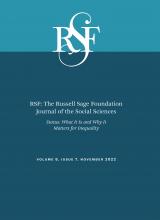Research Article
Open Access
Status as Deference: Cultural Meaning as a Source of Occupational Behavior
E. K. Maloney, Kimberly B. Rogers, Lynn Smith-Lovin
RSF: The Russell Sage Foundation Journal of the Social Sciences November 2022, 8 (7) 70-88; DOI: https://doi.org/10.7758/RSF.2022.8.7.04
E. K. Maloney
aGraduate student in the Department of Sociology at Duke University
Kimberly B. Rogers
bAssociate professor of sociology at Dartmouth College
Lynn Smith-Lovin
cProfessor of Arts and Sciences in the Department of Sociology at Duke University

REFERENCES
- ↵
- Ambrasat, Jens,
- Christian von Scheve,
- Gesche Schauenburg,
- Markus Conrad, and
- Tobias Schröder
- ↵
- Anderson, Cameron,
- Robb Willer,
- Gavin J. Kilduff, and
- Courtney E. Brown
- ↵
- Benard, Stephen,
- Long Doan,
- D. Adam Nicholson,
- Emily Meanwell,
- Eric L. Wright, and
- Peter Lista
- ↵
- ↵
- Cast, Alicia D
- ↵
- Correll, Shelley J., and
- Cecilia L. Ridgeway
- ↵
- ↵
- ↵
- Freeland, Robert E., and
- Jesse Hoey
- ↵
- Ganzeboom, Harry B.G.,
- Paul M. De Graaf, and
- Donald J. Treiman
- ↵
- Ganzeboom, Harry B.G., and
- Donald J. Treiman
- ↵
- Heise, David R
- ↵
- Heise, David R
- ↵
- Heise, David R
- ↵
- Koenig, Biko
- ↵
- MacKinnon, Neil J
- ↵
- Maloney, Em K
- ↵
- Maloney, Em K
- ↵
- Maloney, Em K
- ↵
- Maloney, Em K., and
- Lynn Smith-Lovin
- ↵
- Morgan, Jonathan H.,
- Kimberly B. Rogers, and
- Mao Hu
- ↵
- Osgood, Charles E.,
- William H. May, and
- Murray S. Miron
- ↵
- Osgood, Charles E.,
- George J. Suci, and
- Percy Tannenbaum
- ↵
- ↵
- Ridgeway, Cecilia L
- ↵
- Ridgeway, Cecilia L., and
- Shelley J. Correll
- ↵
- Ridgeway, Cecilia L., and
- Hazel Rose Markus
- ↵
- Ridgeway, Cecilia L., and
- Lynn Smith-Lovin
- ↵
- Robinson, Dawn T., and
- Lynn Smith-Lovin
- ↵
- Robinson, Dawn T.,
- Lynn Smith-Lovin, and
- Jun Zhao
- ↵
- ↵
- Rogers, Kimberly B
- ↵
- Rogers, Kimberly B
- ↵
- Rogers, Kimberly B
- ↵
- Rogers, Kimberly B
- ↵
- Rogers, Kimberly B
- ↵
- Rogers, Kimberly B.,
- Tobias Schröder, and
- Wolfgang Scholl
- ↵
- Scholl, Wolfgang
- ↵
- ↵
- Schröder, Tobias,
- Kimberly B. Rogers,
- Shuichirou Ike,
- Julija N. Mell, and
- Wolfgang Scholl
- ↵
- Smith, Tom W.,
- Michael Davern,
- Jeremy Freese, and
- Michael Hout
- ↵
- Smith-Lovin, Lynn, and
- David R. Heise
- ↵
- Smith-Lovin, Lynn,
- Dawn T. Robinson,
- Bryan C. Cannon,
- Jesse K. Clark,
- Brent H. Curdy,
- Robert Freeland,
- Jonathan H. Morgan, and
- Kimberly B. Rogers
- ↵
- Treiman, Donald J
- ↵
- Valentino, Lauren
- ↵
- Weber, Max
- ↵
- Weber, Max
- ↵
- Zhao, Jun
In this issue
Status as Deference: Cultural Meaning as a Source of Occupational Behavior
E. K. Maloney, Kimberly B. Rogers, Lynn Smith-Lovin
RSF: The Russell Sage Foundation Journal of the Social Sciences Nov 2022, 8 (7) 70-88; DOI: 10.7758/RSF.2022.8.7.04





